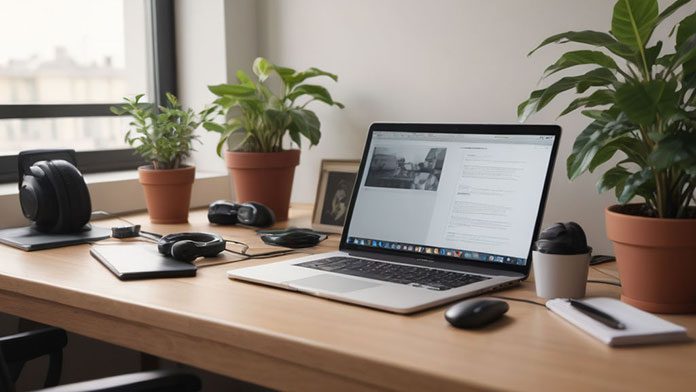Imagine your mind is like a race car, constantly speeding through thoughts and distractions. But what if there was a way to fine-tune your mental focus, like adjusting the engine of that race car?
In this article, we will explore 7 effective ways to improve your mental focus. By understanding the science behind it, setting clear goals, and creating a distraction-free environment, you can enhance your ability to concentrate and achieve your goals with precision.
Table of Contents

Related Video: "How would you say your mental focus is?" by Robert Bowlin
Main Points
– Cognitive exercises and meditation can strengthen neural connections and improve mental focus.
– Creating a distraction-free environment, such as using noise-cancelling headphones and organizing the workspace, promotes concentration and reduces distractions.
– Limiting digital distractions, setting boundaries, and practicing digital mindfulness help to maintain mental focus.
– Prioritizing a healthy lifestyle, including a balanced diet, regular exercise, and quality sleep, supports optimal mental focus.
The Science Behind Mental Focus

To improve your mental focus, you need to understand the science behind it. Mental focus is influenced by various neurological processes that occur in the brain. The brain consists of billions of neurons that communicate with each other through electrical and chemical signals. When you engage in cognitive exercises, such as problem-solving or memory tasks, these neurons form new connections and strengthen existing ones, leading to improved mental focus.
Neuroplasticity, the brain’s ability to change and adapt, plays a crucial role in enhancing mental focus. Through repeated practice and exposure to challenging tasks, neural pathways associated with attention and concentration become more efficient. This means that with consistent effort, you can train your brain to sustain attention for longer periods and ignore distractions more effectively.
Research has shown that specific cognitive exercises can have a significant impact on mental focus. For example, meditation and mindfulness practices have been found to increase attention control and reduce mind-wandering. Additionally, brain training games and puzzles that require focused and sustained attention can improve mental focus over time.
Understanding the neurological processes involved in mental focus and incorporating targeted cognitive exercises into your routine can help you enhance your ability to concentrate and stay focused on tasks at hand. By actively engaging your brain and practicing these exercises consistently, you can sharpen your mental focus and improve your overall cognitive performance.
Understanding the Factors Affecting Mental Focus

To truly understand the factors affecting your mental focus, it’s crucial to examine the impact of external distractions on your ability to concentrate.
These distractions, such as noise or visual stimuli, can significantly hinder your focus and productivity.
Additionally, exploring the role of mindfulness practice in improving mental focus can provide valuable insights into techniques that can enhance your ability to stay focused and engaged.
External Distractions’ Impact
You need to be aware of how external distractions can significantly impact your mental focus. External distractions refer to any stimuli from the environment that divert your attention away from the task at hand. These distractions can come in many forms, such as noise, visual clutter, or interruptions. Research has shown that external distractions can lead to decreased productivity, increased errors, and difficulty concentrating. To minimize the impact of external distractions on your mental focus, it is important to employ effective strategies. Here are some strategies for minimizing distractions:
| Strategies for Minimizing Distractions | Examples |
|---|---|
| Create a conducive environment | Find a quiet space, eliminate clutter |
| Use noise-cancelling headphones | Block out background noise |
| Set boundaries and communicate | Inform others about your need for uninterrupted focus |
| Utilize time management techniques | Break tasks into smaller, manageable chunks |
Role of Mindfulness Practice?
Regularly practicing mindfulness can greatly improve your mental focus.
Mindfulness techniques, such as meditation and deep breathing exercises, can help calm the mind and reduce distractions. One study published in the Journal of Cognitive Enhancement found that mindfulness training improved attention and working memory in college students.
Another study published in the journal Psychological Science found that just two weeks of mindfulness training led to better focus and reduced mind-wandering.
The benefits of mindfulness extend beyond just improving focus. Research has shown that it can also reduce stress, enhance emotional well-being, and improve cognitive function.
Setting Clear Goals for Improved Mental Focus

Focus on specific objectives to enhance your mental clarity and productivity. Setting clear goals is essential for improving mental focus and achieving success. When you have a clear goal in mind, your mind becomes more focused, and you can direct your energy towards achieving that goal.
Here are some effective ways to set clear goals for improved mental focus:
– Define your goals: Clearly define what you want to achieve. Make sure your goals are specific, measurable, attainable, relevant, and time-bound (SMART goals). This clarity will provide a roadmap for your actions and help you stay focused.
– Break it down: Break your big goals into smaller, manageable tasks. By breaking them down, you create a step-by-step plan that’s easier to follow and maintain motivation.
– Prioritize and schedule: Prioritize your goals based on their importance and urgency. Set deadlines for each task and create a schedule to stay organized and focused.
Creating a Distraction-Free Environment
To improve your mental focus, consider using noise-cancelling headphones to block out distractions and create a more conducive environment for concentration.
Additionally, organizing your workspace can help reduce clutter and promote a clearer state of mind.
Noise-Cancelling Headphones for Focus
Wearing noise-cancelling headphones can greatly enhance your ability to maintain a distraction-free environment. Here are some key benefits of using noise-cancelling headphones for studying:
– Improved focus: Noise-cancelling headphones actively reduce background noise, allowing you to concentrate better on your tasks and studies.
– Increased productivity: By eliminating distractions, noise-cancelling headphones help you stay focused for longer periods of time, leading to increased productivity.
– Reduced stress: Studies have shown that noise-cancelling headphones can reduce stress levels by creating a calm and peaceful environment.
When it comes to choosing the right noise-cancelling headphones for better concentration, consider the following options:
– Over-ear headphones: These provide excellent noise isolation and are perfect for studying in noisy environments.
– In-ear headphones: Compact and portable, these are great for on-the-go studying or when you need to block out external noise.
– Wireless headphones: With no wires to tangle, wireless noise-cancelling headphones offer convenience and freedom of movement.
Investing in noise-cancelling headphones can be a game-changer for your ability to stay focused and achieve optimal mental performance.
Organizing Workspace for Concentration
Clear your desk of unnecessary clutter to create a clean and organized workspace that promotes concentration. Workspace organization plays a crucial role in enhancing productivity and focus.
A clutter-free environment eliminates distractions and allows you to fully immerse yourself in your tasks. Keep essential items within reach, such as pens, notebooks, and reference materials, to minimize the need for constant searching and interruptions. Utilize storage solutions like shelves, drawers, and file organizers to keep your workspace tidy and easily accessible.
Use productivity hacks like color coding, labeling, and creating to-do lists to stay organized and prioritize your tasks effectively. Research shows that an organized workspace not only improves focus but also enhances mental clarity and reduces stress levels.
Limiting Digital Distractions Effectively
Minimize the presence of electronic devices in your workspace to create a distraction-free environment. Limiting digital distractions is crucial for improving mental focus and productivity.
Here are three effective strategies to help you achieve a distraction-free workspace:
– Digital detox: Take regular breaks from technology by setting designated periods of time where you disconnect from electronic devices. This allows your brain to rest and recharge, enhancing your ability to concentrate.
– Time blocking: Divide your workday into specific time blocks dedicated to different tasks. During these blocks, turn off notifications and resist the urge to check your email or social media. By focusing on one task at a time, you can maintain a higher level of concentration.
– Create physical barriers: Place your phone out of sight and reach, or even in another room. Use browser extensions or apps that block access to distracting websites. These physical and digital barriers help minimize the temptation to engage with digital distractions.
The Power of Mindfulness and Meditation for Mental Focus
To enhance your mental focus, try incorporating mindfulness and meditation into your daily routine.
Mindfulness is the practice of being fully present and aware of the present moment, without judgment. It involves paying attention to your thoughts, feelings, and sensations in a non-reactive manner. Research has shown that mindfulness has numerous benefits for mental focus. It improves attention and concentration, reduces mind-wandering, and enhances cognitive flexibility.
Meditation, on the other hand, is a technique that involves focusing your attention on a specific object, such as your breath or a mantra. This practice helps calm the mind and cultivate a state of relaxed alertness. There are various meditation techniques you can try, such as focused attention meditation, loving-kindness meditation, and body scan meditation. Each technique has its own benefits and can be tailored to suit your preferences and needs.
Incorporating mindfulness and meditation into your daily routine can have a profound impact on your mental focus. By practicing mindfulness, you become more aware of distractions and are better able to redirect your attention back to the task at hand. Meditation, on the other hand, strengthens your ability to sustain attention and resist distractions.
Together, these practices can help you develop the mental discipline and resilience needed to stay focused in today’s fast-paced, information-driven world.
Developing Effective Time Management Strategies
If you want to improve your mental focus, it’s important to develop effective time management strategies. Prioritizing tasks and avoiding multitasking are two key elements of effective time management. Here are three strategies to help you manage your time more efficiently:
– Create a to-do list: Start by listing all the tasks you need to accomplish. Then, prioritize them based on urgency and importance. This will help you stay focused on the most critical tasks and avoid wasting time on less important ones.
– Set specific goals and deadlines: Breaking down larger tasks into smaller, manageable goals can make them less overwhelming. Assign deadlines to each goal to create a sense of urgency and hold yourself accountable.
– Eliminate distractions: Identify the things that distract you the most and find ways to minimize or eliminate them. This could include turning off notifications on your phone, blocking distracting websites, or finding a quiet space to work.
By implementing these strategies, you can improve your time management skills and enhance your mental focus.
Nurturing a Healthy Lifestyle to Enhance Mental Focus
To enhance your mental focus, prioritize nurturing a healthy lifestyle. One important aspect of a healthy lifestyle is maintaining a balanced and nutritious diet. Research shows that certain foods can significantly impact cognitive function. For instance, foods rich in omega-3 fatty acids, such as fatty fish, walnuts, and flaxseeds, have been linked to improved brain health and enhanced focus. Additionally, consuming fruits and vegetables that are high in antioxidants, like blueberries and spinach, can help protect the brain from oxidative stress and promote mental clarity.
Exercise is another crucial component of a healthy lifestyle that can greatly benefit your mental focus. Engaging in regular physical activity increases blood flow to the brain, which enhances cognitive function and attention span. It also stimulates the release of endorphins, neurotransmitters that improve mood and reduce stress, enabling you to concentrate better on tasks. Incorporating activities such as walking, jogging, or yoga into your daily routine can have a significant positive impact on your mental focus.
Frequently Asked Questions
How Does Mental Focus Affect Academic Performance?
Improving your mental focus has a significant impact on academic performance. By enhancing your ability to concentrate and block out distractions, you can improve your productivity and retention of information, leading to better grades.
Can Certain Foods or Supplements Improve Mental Focus?
Certain foods and supplements can improve mental focus. Natural options like blueberries and omega-3 fatty acids have shown positive effects, while artificial supplements may offer short-term benefits but lack long-term evidence.
What Role Does Exercise Play in Enhancing Mental Focus?
Exercise benefits your mental focus by improving cognitive function. It enhances blood flow to the brain, stimulates the release of neurotransmitters, and promotes the growth of new brain cells, all of which contribute to better concentration and attention.
How Does Sleep Quality Impact Mental Focus?
Sleep deprivation can greatly impact your mental focus. When you don't get enough quality sleep, your cognitive function suffers, making it harder to concentrate and stay focused throughout the day.


